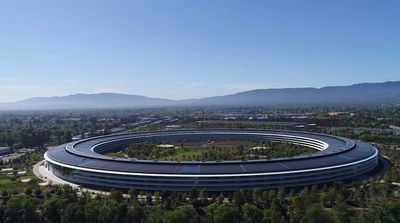Some Apple staff feel more confident to speak about their employer amongst themselves, to the press, and on social media due to the company's switch to remote working and increased use of Slack over the past year, The Information reports.

Apple's Slack became a "virtual town square" at the company, providing a platform for employees to protest the return to in-person work, decisions to hire controversial new employees, and more. Until the transition to remote working last year due to the global health crisis, Apple's culture of secrecy limited the opportunities for grassroots employees to organize independently.
Apple employees are asked to sign multiple agreements vowing to not disclose information about their work, including to spouses and other colleagues at the company. When work was conducted in person before last year's changes, the interaction between different parts of the company was heavily limited, with physical access to other departments being restricted to those authorized to be there. A software engineer in Apple's global security team, Cher Scarlett, said:
Before Slack, it was difficult for employees to talk to somebody who works in retail unless you went to the store. It was impossible to talk to someone who works in hardware as I don't work with anyone there. You're giving people a platform that allows them to connect with people they wouldn't ordinarily connect with.
A former Apple procurement manager told The Information that Apple's internal employee directory was so difficult to navigate that it was virtually impossible to find out, for example, who was in charge of iPad marketing in Latin America.
In the fall of 2019, Apple allowed its various teams to start adopting Slack at their own pace. Until the global health crisis prompted the widespread adoption of Slack, the company preferred to use its own software at work, with some exceptions such as Cisco Jabber. Apple's own iMessage platform is reportedly heavily relied upon for internal communication.
There are now believed to be 3,000 internal Apple Slack channels with more than 10,000 members, which has made it considerably easier for employees to communicate with each other and unite around common goals. Last year, channels for a range of topics, including #announcements, #careers, #help-desk-support, #talk-investments, and #talk-trading, were created by employees. A number of channels also center on different religious communities among Apple employees.
The popular channels #remote-work-advocacy and #talk-benefits center on advocacy and are said to contain more than 7,000 members and led employees' push to continue working remotely earlier this year. The channel #women-in-swe contains more than 2,000 female software engineers and advocated the firing of an allegedly misogynistic new employee last year. One former employee said:
People are fully remote now, so what was previously water-cooler chat has become much more candid because the digital environment feels safer and less personalized.
The move toward being more outspoken about the company has also spilled over to social media, with an Apple engineering program manager posting accusations of sexism, discrimination, and other inappropriate behavior on Twitter, even sharing partially redacted internal Apple emails and Slack messages about her case.
In addition, another employee posted a photo of Apple's medical release form on Twitter that asked employees to release their healthcare information to the company as a proviso for the approval of medical leave and remote work. Other posts accused Apple's human resources department of shutting down surveys about pay transparency.
"Slack and social media have been absolutely the biggest catalyst in giving workers the ability to organize," Scarlett said. She added that she feels comfortable speaking on the record to the media about these issues without Apple's approval since "a nondisparagement clause doesn't mean you can't say anything bad about the company. You can openly talk about discrimination."
Apple employees are now said to have started a Discord server to discuss company issues, which has a waiting list of more than 200 applicants, and 15 employees launched a website around the hashtag #AppleToo to collect testimonials about discrimination or harassment at the company.























